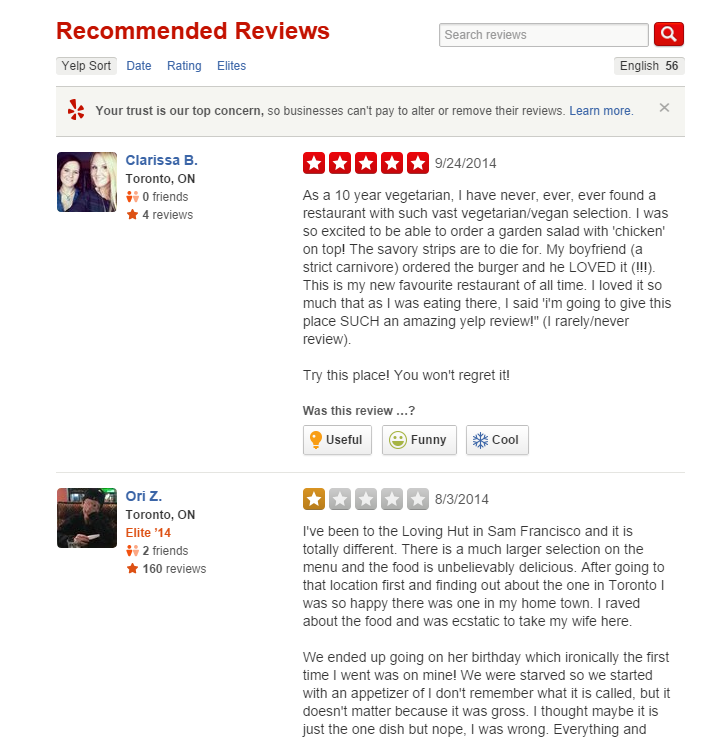Recently, I was pleased to see such extensive coverage of Nancy Peterson and HomeStars in a piece by Diane Jermyn in The Globe and Mail.
One common misconception that cropped up, and you see it often with accounts of today’s online review sites, is an assumption that you should see about the same number of negative reviews as positive reviews. Seriously? Even with a low-barrier-to-entry task like writing a short novella or opening a smoothie stand, you rarely see an even distribution. Those who take the risk to devote their time (or lives) to an enterprise, unsurprisingly, typically get a healthy number of 5- and 4- star reviews mixed in with a small number of complaints.
Review sites — at least most of the successful, far-reaching ones — aren’t simply places we as consumers go to wallow in negativity and complaints. Take TripAdvisor, a website that I suspect a healthy majority of us use and support, despite the inevitable warts. Since they created a designation called an annual Certificate of Excellence, determined by the volume of reviews over a certain threshold of positivity, you see many proud businesses displaying their certificates. Surely this helps them win customers. All this means is that TripAdvisor is pro-business and pro-consumer, possibly in just the right measure.
Some people are determined to smell a rat in all this. But I can assure you that HomeStars, TripAdvisor, and Yelp do everything in their power to sniff out fake reviews, and to develop richer and richer content so that consumers can find appropriate fits with businesses that suit their needs and tastes.
Think about what kind of world we would actually be living in if websites like HomeStars were strewn with a huge number of negative reviews, instead of the current situation that calls out a “few bad apples”. That would indicate that homeowners were getting ripped off right and left. We’d be living in a completely lawless and unaccountable world. Let’s remember, amid all the scary yet entertaining horror stories we see on reality TV (Holmes Makes It Right, etc.), that there are tons of reputable companies out there that do depend on maintaining their reputations long term. If anything, many of the contractors I’ve met and worked with don’t get enough praise, online or elsewhere. And yes, of course, this makes it vital that we set up systems to call out the bad apples.
Turning to my favorite subject, food, again, when you think about writing food reviews, isn’t it mostly to reward entrepreneurs and chefs who have taken the trouble to create a great experience for you? If Yelp (and life) were all about every second meal deserving a one-star rating, we’d all be walking around with food poisoning half the time. Our life expectancy would be significantly shortened. Mostly, we want to trade positive restaurant reviews. Sometimes, we want to say a place is overrated. A small percentage of the time, we’ll want to give thumbs-down. Personally, though, unless a business owner has really wronged me, I’ll simply reward them with silence. As a community, we can also weed out the bad guys by diverting plenty of positive attention to the good guys. So the bad guys might only get business from, well, folks who never read reviews.
I have to admit, when I read restaurant reviews I’m sometimes baffled by the negative ones. I’ve been to the Loving Hut in Toronto many times. The food and the service are fantastic. For some reason, though, one reviewer believes the food at this location just doesn’t taste as good in Toronto as it does in San Francisco. For enthusiasts of this location, does it even matter? The Loving Hut originated in France. I can guarantee you that the Paris location will taste more romantic and more expensive than the Toronto version does, too. However, for a place I can walk to from the office and get pretty much any vegan dish imaginable, it gets my five stars. The negative review here is simply misleading, possibly downright crazy.
The trustworthiness of review content is paramount, of course. Review sites do no one any favors if they’re biased, or “on the take.” So why is it that we assume that a positive review is a biased review? As a customer, I’m often biased in favor of a trusted vendor. That means I’m pro-business. There’s nothing fake about that.

